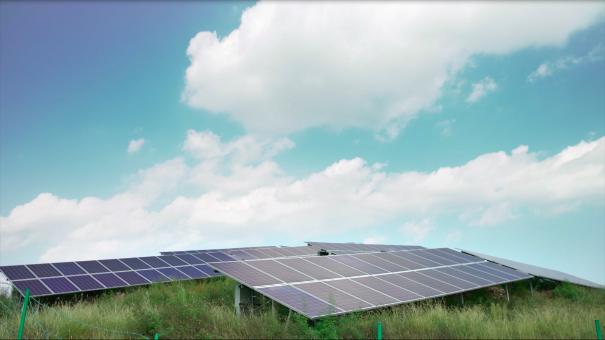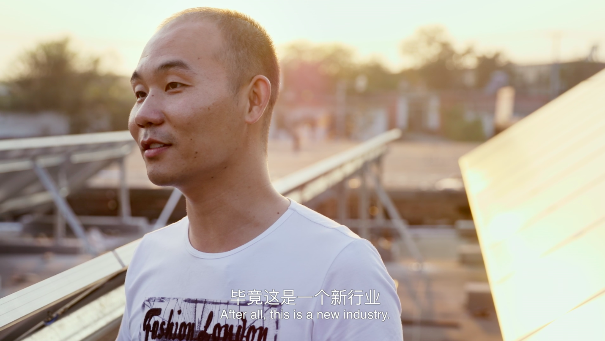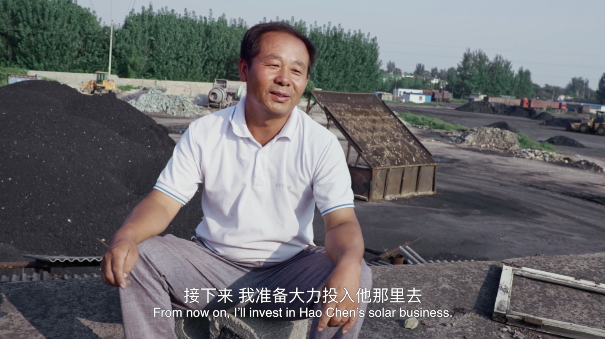How a failing family-run coal operation found new opportunities in the solar industry.
Another phase of China’s energy revolution is building. Quieter than the headline-grabbing super projects of the northwest, it is nonetheless just as powerful.
From the entrepreneur who ditched coal and became a solar pioneer, to a group of residents that is solarising their communities one rooftop at a time, Greenpeace East Asia set out to see how China’s mammoth energy transition is playing out in the lives and homes of ordinary Chinese people.
For years, Chen Yongshuan and his son, Chen Hao, ran a small coal mine in Hebei Province. Like many small-scale coal merchants, their business has been struggling in the past few years: “Every year the pollution is getting worse. Every year, the prices drop. You can’t make a profit,” said Chen Yongshuan.
Since 2013, fuelled by China’s nation-wide war on pollution and plummeting coal prices, coal mines have been rapidly closing, hitting small-scale operations like Chen Yongshuan’s the hardest. The father and son entrepreneurs from Hebei Province – famously home to some of China’s most heavily polluted cities – were in need of a solution.
CPIC PV power plant in Quyang County, Hebei Province
In the end, it was Chen Hao who suggested quitting the coal business and making the switch to solar: “I had an understanding of solar, through these power plants in the mountains. I knew that distributed solar was workable.”
His father however, was more skeptical, as was the rest of their family. He opted to continue running the coal plant, while Chen Hao attempted to get the new solar venture off the ground.
It was no mean feat. All of his potential customers were local people, many of whom had no idea what a PV panel was, let alone any interest in spending their hard-earned money on purchasing one. “When you said ‘solar power’, they just didn’t understand what it was.”
In 2013, for an entire year, Chen Hao went into the village every day to try and publicise his new business, sometimes shouting himself hoarse in an attempt to drum up interest.
Though it took a lot of patient explanation and perseverance, customers eventually began to take notice. As word spread, more and more people bought into the trend, Chen Hao’s company was able to prise open the local market and get people connected to the grid.
By 2016, the family company had installed 1.5 megawatts of solar capacity in the area, covering roughly 15,000 meters of rooftop space. Now, they are responsible for 30% of their home county’s distributed PV market share.
For rural people with a low income, drumming up the finances to make the first investment into household solar is difficult to say the least. So in 2014, Chen Hao lobbied local banks to provide small-scale ‘PV’ loans to customers to help them get past the initial financial hurdle.
Chen Hao sees the switch from “You have to follow society’s trends. The country has to develop. We, as a small family, also have to develop. We hold firm that this industry has a promising future.”
Even his father has now come around to the idea. “From now on, I’ll invest in Chen Hao’s business, I’ll listen to my son. I’ll stop the [coal plant] business next year.”
Chen Yongshuan’s change of heart couldn’t come soon enough. For many of China’s small merchants, it’s a matter of when, not if, their operations will be shut down, either through dwindling profits, or as part of a nationwide clampdown on coal consumption. In 2015, 6500 small-scale coal mines were in operation in the country. 500 were shut down that same year. Of the remaining 6000, half are expected to close by the end of 2020.
China’s solar energy industry is booming. Last year, while coal demand saw record-breaking drops, solar capacity doubled. Solar in China is more flexible and accessible than it has ever been. With the energy transition comes new opportunities, not only to enter a burgeoning new industry, but to also make a valuable contribution to fighting China’s infamous air pollution.
Whether China’s small coal merchants are able to take this opportunity is yet to be seen, but the increasingly limited prospects in China’s coal industry have come sharply into focus.
As Chen Hao said, “We have to move forwards, not backwards.”
Read more about China’s grassroots renewables transition here and here.
Anna McGurk is a content writer at Greenpeace East Asia




